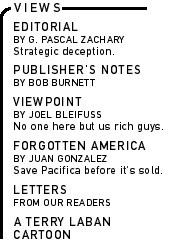

|

|

|

|
| |
|
|
|
President Bush's announcement that he intends to spend $1.6 trillion in projected revenues--the so-called "surplus"--on a 10-year tax cut is in itself nothing to get worked up about; after all, this is something he has long promised. What is galling is that so many journalists, particularly pundits and editorial writers, refuse to describe what Bush is really up to--transferring a massive amount of the nation's wealth to the richest 1 percent of the U.S. population in the guise of a tax cut. In announcing his plan, Bush said, "A lot of people feel as if they have been looking through the window at somebody else's party. It is time to fling those doors and windows open and invite everybody in." Yeah, to clean up. Indeed, under the Bush plan a family with a $1 million income would benefit to the tune of $46,094--enough to hire two full-time servants. The Chicago Tribune sees things differently. A Tribune editorial put it this way: "Yes, [Bush's proposal] will give the wealthy a sizable tax cut, it will also reduce to zero the income tax burden of thousands of lower-income Americans." Not quite. According to an analysis by the Center on Budget and Policy Priorities, more than 12.2 million low-and moderate-income families with children--31.5 percent of all families--would not receive any tax cut under Bush's proposal, since they don't pay any income tax. On the other hand, about 43 percent of the tax-cut dollars, or $688 billion, would go to families making more than $900,000. All of which led Sen. Paul Wellstone (D-Minnesota) to quip, "The Bush plan is like Robin Hood in reverse." Yet the Tribune insists on describing the Bush tax boondoggle as "fair" and "simple." It would seem that their editorial judgment has been addled by the fact that the Tribune Company's top brass will end up doing very well if people are convinced that what Bush is doing is very good. For example, Tribune CEO John Madigan and his family stand to reap, based on his 1999 salary of $2.56 million, at least $155,000 from the Bush tax cut. Few newspapers, if indeed any, have championed the fairer alternative that has been proposed by the Progressive Caucus. Known as the American People's Dividend, this plan, which was conceived by Rep. Bernie Sanders (I-Vermont), would provide every American with a $300 check every year over the next 10 years, as long as revenues remain at the level currently projected. Sander's plan would cost $900 billion ($700 billion less than Bush's). "Our premise is based on the fact that Americans, rich and poor, helped build the surplus," says Sanders, "and therefore everyone should get an equal part of that surplus--not just the wealthy." Endorsing the proposal, Progressive Caucus member Rep. Jerrold Nadler (D-New York) said, "When the president talks about the $25,000-a-year waitress serving coffee to the $250,000-a-year lawyer and how both of them would get tax relief, he's right. But the waitress can buy another cup of coffee with her tax cut while the lawyer will be able to buy the whole diner." At its Los Angeles meeting, the AFL-CIO endorsed the Progressive Caucus' plan after a briefing by House Minority Whip David Bonior (D-Michigan). "It's one way to have a tax cut that reaches everybody equally," said AFL-CIO Secretary Treasurer Richard Trumka. Don't expect to hear much about this proposal. Such discussion is apparently outside the parameters of mainstream discourse. Newsweek ignored the proposal in its "Tax Cuts & You" cover story. And on ABC's This Week, Cokie Roberts informed viewers, "Well, I think it's going to be an across-the-board rate cut, and there are no Democrats arguing against that anymore." No, just the 55 members of the Progressive Caucus and, now, the entire leadership of the AFL-CIO. With an American People's Dividend, a couple eking out an existence in low-paid service jobs would get $600, as would Treasury Secretary Paul O'Neill and his wife, Nancy. Under Bush's plan, the working-poor couple would receive next to nothing, while Paul and Nancy O'Neill, if he were to make this year what he did last year as CEO of Alcoa ($57 million), would net about $2.6 million. Understandably, O'Neill is quick to defend the plan from critics who characterize it as a giveaway to the rich. "I don't think this society should still be operating with a robber-baron premise as the basis for how we discuss public policy," he told the Washington Post. "I think it is really corrosive to have this argument about the rich and the poor." Going on the morning TV circuit, O'Neill said that the Democrats "don't understand that what people who have substantial income do with their money is they reinvest it in the economy so we can create more jobs." What's more, the little people--those who won't get a "substantial reflow of money," as he calls it--can do their part too. In testimony before the House Ways and Means committee, O'Neill
explained that the tax plan was needed since "getting money in people's
pockets quickly will enable Americans struggling with consumer debt
to pay their credit card bills and get ready for another consumer-led
expansion."
|

